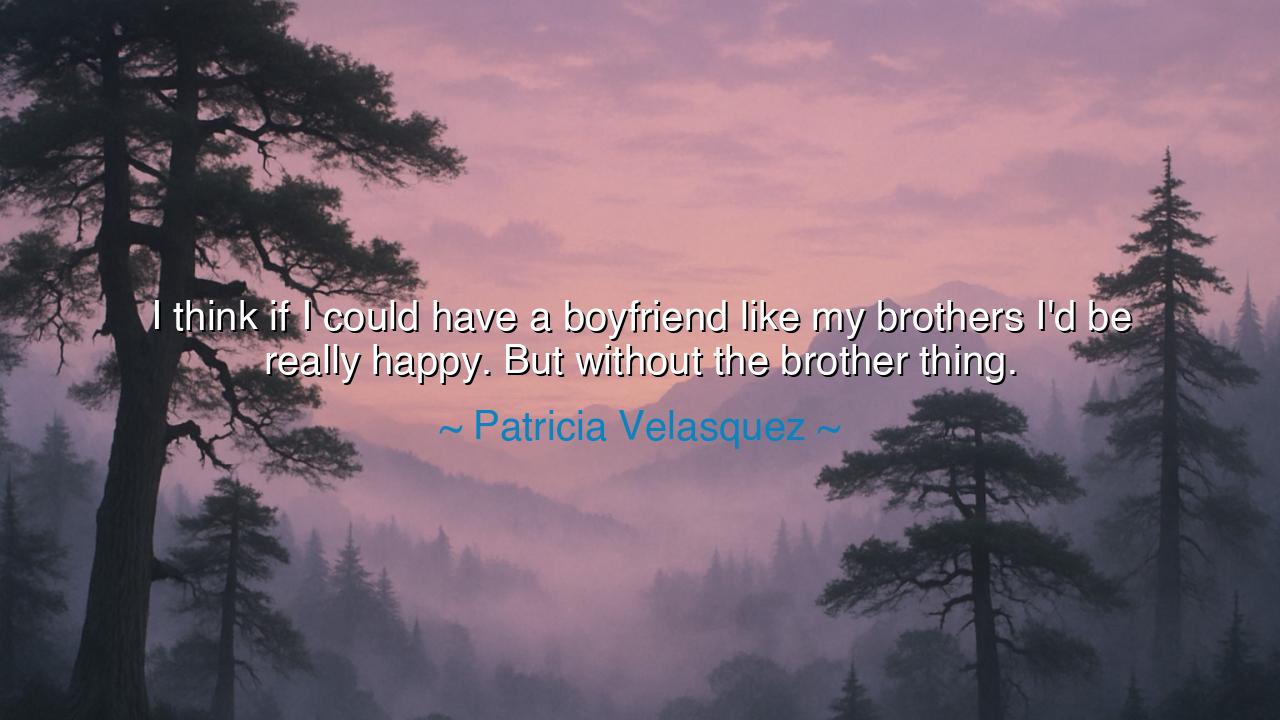
I think if I could have a boyfriend like my brothers I'd be
I think if I could have a boyfriend like my brothers I'd be really happy. But without the brother thing.






In the words of Patricia Velasquez, “I think if I could have a boyfriend like my brothers I’d be really happy. But without the brother thing.” — we hear a sentiment that is both tender and timeless. Beneath the humor of her remark lies a deep reflection on love, trust, and kinship — the yearning for companionship built upon the same foundations that make family sacred: loyalty, protection, and understanding. Her words, though light, carry the weight of a universal desire — to find in romantic love the same unconditional acceptance that we find in those who have known us since the beginning.
The meaning of her words is rooted in the longing for familiarity within the unfamiliar, for safety within passion. Her brothers represent not only family, but the archetype of love without pretense — the kind that does not demand perfection, that loves despite flaws, that remains constant through joy and sorrow. To wish for a partner like one’s brothers is to wish for a relationship that mirrors that steadfastness — one built on shared laughter, mutual defense, and a deep, wordless bond. Her humor in adding “without the brother thing” only emphasizes that what she seeks is not familial affection, but the purity of its spirit — love stripped of competition, fear, and performance.
The origin of this wisdom lies in the sacred bond between siblings — one of the oldest and purest forms of human connection. In a brother or sister, we often find the mirror of our own soul — one who has seen our weakness and yet does not turn away, who knows our faults and still calls us family. It is a relationship forged not by choice, but by destiny, and through its trials we learn what love, in its truest form, should look like. Thus, Patricia Velasquez’s reflection is not merely about family or romance — it is about the kind of love that feels like home, the kind that is both familiar and free.
This truth has echoed through the stories of the ancients. Consider Antigone and her brother Polyneices in the tragedies of Greece. Though bound by tragedy and death, Antigone’s loyalty to her brother transcended the laws of men. She chose to honor him, even at the cost of her own life, saying, “I was born to love, not to hate.” Such devotion, fierce and unwavering, shows that the bond between siblings often embodies the noblest form of love — one that is selfless, courageous, and enduring. To long for a romantic partner who carries that same spirit is to seek not mere passion, but companionship forged in virtue.
In her words, we also find a yearning for integrity and gentleness — qualities that the modern world, with its hurried affections, too often forgets. The brother, in her heart, stands as a symbol of protection and constancy. He is the one who defends, who listens, who forgives without keeping score. To wish for such qualities in a lover is to recognize that the truest love must first be kind, that affection without respect is as fleeting as a shadow. Velasquez’s remark, though simple, becomes a call to those who seek love — to look not for the dazzling, but for the dependable; not for the perfect, but for the present.
And yet, her reflection also speaks of balance — of the need to blend the warmth of friendship with the spark of desire. The love between siblings, though pure, lacks the transformative fire that defines romantic connection. To wish for both is to desire a union complete — one that holds the constancy of family and the passion of lovers. The ancients called this union philia and eros joined together — a balance between affection of the soul and the hunger of the heart. Few find it, but all who do are changed forever, for in such a bond lies the echo of divine harmony.
Thus, the lesson of Patricia Velasquez’s words is this: seek a love that feels like kinship — one that knows you, forgives you, and stands beside you even when the world grows cold. Do not chase perfection in another; instead, seek the warmth of familiarity, the safety of trust, and the joy of laughter that feels like home. Build love not upon illusion, but upon friendship, respect, and shared humanity. For the love that endures is not born of lightning, but of understanding — steady as a heartbeat, enduring as family.
And so, my children, remember this wisdom: the truest love is not always the one that burns brightest, but the one that stays. Find the person who feels like your brother in spirit — loyal, kind, unpretentious — but who loves you with the fire that only true partnership brings. For when passion meets familiarity, and desire meets trust, love ceases to be a fleeting emotion and becomes what it was always meant to be — a home for the soul.






AAdministratorAdministrator
Welcome, honored guests. Please leave a comment, we will respond soon